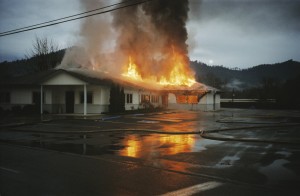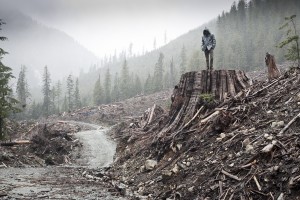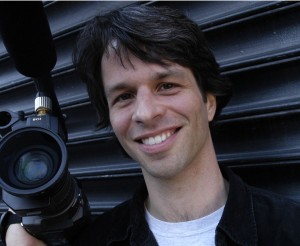[Article originally appears: http://www.pbs.org/pov/blog/2011/06/bamcinemafest_2011_marshall_curry_if_a_tree_falls.php]
Marshall Curry is one of New York’s more prolific documentary filmmakers having made “Street Fight” (POV, 2005), for which he received an Oscar® nomination, and “Racing Dreams” (POV, 2011). In his latest film (co-directed by Sam Cullman), “If a Tree Falls: A Story of the Earth Liberation Front” (coincidentally, a film you can watch later this summer on POV), Curry follows the story of environmentalist Daniel McGowan and what led to his house arrest and subsequent imprisonment for domestic terrorism. Even though this blogger lives in the same Brooklyn neighborhood as the filmmaker, I conducted this conversation over the phone two days before his film launched the documentary lineup at BAMcinemaFEST 2011. (You can also read my preview of BAMcinemaFEST’s documentary slate in my last post.)
Adam Schartoff: What influences your choice in making a film? Is it completely intuitive decision making or is there a practical approach to it, like what’s commercial or timely?
Marshall Curry: I guess the main thing that I am drawn to is making a story that I would want to watch. If you have to work on something for years and you get bored with it, that’s a disaster. All three of the movies I’ve made [Street Fight, Racing Dream, If a Tree Falls: A Story of the Earth Liberation Front] have kept me engaged with new questions and new twists all the way through the process. The film has to be about someone or something complex enough to keep me engaged. One of the things about this story that attracted me was how different Daniel was from what I expected. He turned out to be nothing like what I thought a domestic terrorist would be like. It’s when stereotype cuts against reality, that’s appealing to me. Of course the characters have to be compelling and I need to see an arc in the story. There needs to be a beginning, a middle and an end so that it feels like a movie. All those things are important when I’m looking for a new project.

Curry: From start to finish, probably five years. It was about five years ago when Daniel was arrested out of my wife’s office. That started the story. So Sam Cullman [the film’s co-director] and I decided to jump in.
AS: During this same period you were making “Racing Dreams”?
Curry: That’s right. During the first year I was shooting both films. Then I put “If a Tree Falls…” on hold while I edited “Racing Dreams”. As soon as I finished “Racing Dreams”, I started editing this one.
AS: Daniel was under arrest for the crux of the film. Was he already under house arrest when you began filming or did you start before that?
Curry: We started shooting as soon as he was released to house arrest. We shot for a year and change until he went to prison. Then we started doing pick-up interviews for the next couple of years, like the prosecutor and folks like that. And we were also doing archival research during those years.
AS: You had some wonderful material with Prosecutor Kirk Engdall [Assistant U.S. Attorney for the District of Oregon]. He ended up representing the viewer in a way, which came as a surprise. Initially he comes off very business-as-usual, very by-the-book. Toward the end he starts coming around and you get more of a human side to him. He seemed almost sympathetic with Daniel’s plight. Was that a result of him trusting you guys?

Curry: No, not really. Engdall is a firm believer in the law. He did not think what Daniel and the others in the Earth Liberation Front did was okay in any way. And he thought they should go to prison for their crimes. We had maybe three hours with him. Right before I took off the microphone, I asked him if his feelings had changed at all, having worked on the case for so long. That’s when he spoke about the complexity of human nature and how people change. That’s what closed the movie.
AS: I suppose that, to some degree, he was prosecuting crimes — or criminals — not just human beings. It’s as though he verbalized what you were trying to do as filmmakers by humanizing Daniel, humanizing criminals in general.
Curry: Right, not to excuse the action but to understand it. For us, the thing that motivated making the film was how this person could commit these multi-million dollar arsons. There are a lot of answers to that question and they take on a number of forms — there’s a political answer, an environmental answer and an emotional answer. We felt that it was important to get at all those things. So the film ends up being about someone coming of age but it’s also about environmental destruction. It’s a story about criminality but also a story about frustration at a democratic process that doesn’t seem as responsive as it should. Even in the title of the film, we call it “A Story of the Earth Liberation Front”, not “The Story”. We decided from the beginning to just focus on one individual’s story and let that shed light on the larger process.
AS: So you have three films that have come out in the last six years. Do you consider yourself a filmmaker who works swiftly?
Curry: [laughs] It doesn’t feel that way. It feels more like a snail’s pace.
AS: It seems as though in the latter part of this past decade things were beginning to bunch up.
Curry: True. I love shooting and I love editing, so I always like having projects going. Recently someone was telling me that in England the documentary style is to bang these movies out in like 12 weeks of editing. For me, all three of these films have taken over a year of editing. And usually with more than one editor. Editing is the most time-consuming and painstaking part of the process. But I love the work.
“If a Tree Falls: A Story of the Earth Liberation Front” screens at BAMcinemaFEST on Saturday, June 18, 2011 at 2PM and the film opens theatrically at the IFC Center on Wednesday, June 22, 2011. You can find out more about the film at www.ifatreefallsfilm.com and on POV’s website.


